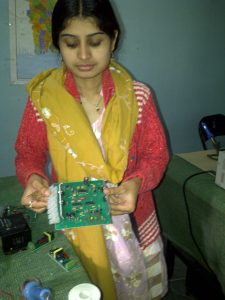IEEE is a large, diverse technical community with social and humanitarian obligations. The IEEE SSIT Technical Committee for Sustainability brings together members, practitioners and policy makers who have varied interests, backgrounds, and geographies, but who are all bound by a common interest in sustainable systems benefiting people and the planet.
Drawing upon our diverse community of members and the broad perspectives they enable, SSIT has the goal of advising other IEEE initiatives as well as end-user communities, governments, for-profit and not-for-profit organizations on optimizing how technology can be developed, deployed, and managed while understanding and minimizing unintended consequences, particularly to vulnerable end-user communities. This is achieved through devising mechanisms, tools and outreach.
IEEE Planet Positive 2030
In 2022, the SSIT TC Sustainability is pleased to announce its involvement with the IEEE Planet Positive 2030. Planet Positive is a program created by a global, open community of experts supported by IEEE Standards Association.
This community seeks innovation and technology-based solutions to bring humanity closer to achieving the Planet Positive goals of reducing greenhouse gas emission and significantly increasing the regeneration and resilience of Earth’s ecosystems. A diverse set of multidisciplinary experts from around the world have been invited to “translate” technological solutions for corporate and policy readers in a Compendium to guide the actions of technologists, scientific communities, as well as the private and public sectors.
Sustainability Pillars
The Sustainability Technical Committee acknowledges and welcomes the breadth of impact technology can have, with particular attention to these 3 pillars of sustainability:
- Environmental sustainability concerned with the maintenance of Earth’s “life support systems,” such as the atmosphere, oceans and soil necessary for human life and economic production.
- Social sustainability focuses on the human effects of economic systems and includes attempts to eradicate poverty and hunger, and combating inequality.
- Economic sustainability which focuses on the portion of natural resources that provide physical inputs for economic production, including both renewable and exhaustible inputs.
A sustainable approach is systems-based and seeks to understand and respond to the interdependencies of the environmental, social, and economic pillars through which society can be viewed. Such a perspective provides insights into how the internet and the work of IEEE Sustainability efforts can augment collective human intelligence through providing a basis for people-centered collaboration for more effectively addressing global problems, through developing and advancing the emergence of a new paradigm that transcends the limitations of prior national and global governance systems.
Think7
Think7 is an engagement group of leading think tanks from the G7 countries. It works to develop and propose research-based policy recommendations to support the German G7 presidency. The Think7 process is jointly coordinated by the Global Solutions Initiative and the German Institute of Development and Sustainability (IDOS) (former German Development Institute / Deutsches Institut für Entwicklungspolitik (DIE) during the German G7 presidency 2022. Members of this committee participated in developing policies and contributed towards 10 out of 70 policies presented to the German G7 Presidency. Links to the 10 Policy Briefs below
| Global Public-Private Digital Utilities for MSME Recovery and Transition | https://www.think7.org/publication/global-public-private-digital-utilities-for-msme-recovery-and-transition/ | Climate & Environment | Tamara Singh, Fung Mei Lin, Eileen Murray, Anthony Lacavaro, Matthew Gamser, Brian Omwenga, Ndemo Bitange, Homi Kharas, |
| Community Climate Clubs to Motivate and Create Personal Action for an Equitable World | https://www.think7.org/publication/community-climate-clubs-to-motivate-and-create-personal-action-for-an-equitable-world/ | Climate & Environment | John Aston, Ilan Chabay, Jesus Crespo Cuaresma, Mei Lin Fung, David Roos, Pedro Ahlers, Navroop K. Sahdev |
| Scaling up Sustainable Finance to Enable Sustainable Economic Recoveries | https://www.think7.org/publication/scaling-up-sustainable-finance-to-enable-sustainable-economic-recoveries/ | Sustainable economic recovery | Ulrich Volz, Kathrin Berensmann, Stephany Griffith-Jones, Anthony Lacavaro , Irene Monasterolo, Simon Dikau |
| Digital Utilities for Scientific Research Towards an Equitable World | https://www.think7.org/publication/digital-utilities-for-scientific-research-towards-an-equitable-world/ | Social cohesion, economic transformation and open societies | Mei Lin Fung, Declan Kirrane, Kurt Zatloukal, Peter Taylor, Andrew Seely, Evgueni Louikipudis, Tamara Singh, Gora Datta |
| Clean-IT: Policies to Support Energy-Efficient Digital Systems | https://www.think7.org/publication/clean-it-policies-to-support-energy-efficient-digital-systems/ | Climate and environment | Christoph Meinel (Hasso-Plattner-Institut für Digital Engineering gGmbH) , Mei Lin Fung , Maxim Asjoma (Hasso-Plattner-Institut für Digital Engineering gGmbH) |
| Build Digital Public Goods for Health: A Private and Public Sector Global Initiative | https://www.think7.org/publication/build-digital-public-goods-for-health-a-private-and-public-sector-global-initiative/ | Global health | Sarah Fischer (GIZ) , Yolanda Martinez, Skye Gilbert Yoden, Kate Wilson, Mei Lin Fung, Hani Eskandar, Sherman Kong, Garrett Mehl, Derrick Muneene, Max Schumann (GIZ), Jake Watson |
| Research, Evidence and Learning – The Need for a Global Infrastructure | https://www.think7.org/publication/research-evidence-and-learning-the-need-for-a-global-infrastructure/ | Global health | Peter Taylor, Anna-Katharina Hornidge (German Development Institute / Deutsches Institut für Entwicklungspolitik (DIE)), Melissa Leach, Hayley MacGregor, Ali Mehdi (Indian Council for Research on International Economic Relations (ICRIER)), Mei Lin Fung |
| Central Bank Digital Currencies: Governance, Interoperability, and Inclusive Growth | https://www.think7.org/publication/central-bank-digital-currencies-governance-interoperability-and-inclusive-growth/ | Sustainable economic recovery | John Beirne, Nicola Bilotta, Mei Lin Fung, Tamara Singh |
| Keeping the World Economy on Track: Dealing with the Short-Term Emergency and Pursuing Longer-Term Objectives | https://www.think7.org/publication/keeping-the-world-economy-on-track-dealing-with-the-short-term-emergency-and-pursuing-longer-term-objectives/ | Sustainable economic recovery | Paola Subacchi (Queen Mary University of London), David Vines, John Beirne, Andy Filardo, Mei Lin Fung, Alicia Garcia Herrero, Simone Romano (OECD) , Mina Toksoz, Paul van den Noord |
| Towards an Inclusive Climate Alliance With a Balance of Carrots and Sticks | https://www.think7.org/publication/towards-an-inclusive-climate-alliance-with-a-balance-of-carrots-and-sticks/ | Climate & Environment | Axel Michaelowa (Perspectives Climate Research), Philipp Censkowsky (Perspectives Climate Research), Clara Brandi (German Development Institute / Deutsches Institut für Entwicklungspolitik (DIE)) , Michele Stua (Scuola Superiore Sant’Anna), Sonja Peterson (Kiel Institute for the World Economy (IfW)) , Colin Nolden (University of Bristol, Oxford University), Mei Lin Fung (People Centered Internet), Ingo Venzke (The New Institute), Tim Banning |
.







 JOIN SSIT
JOIN SSIT